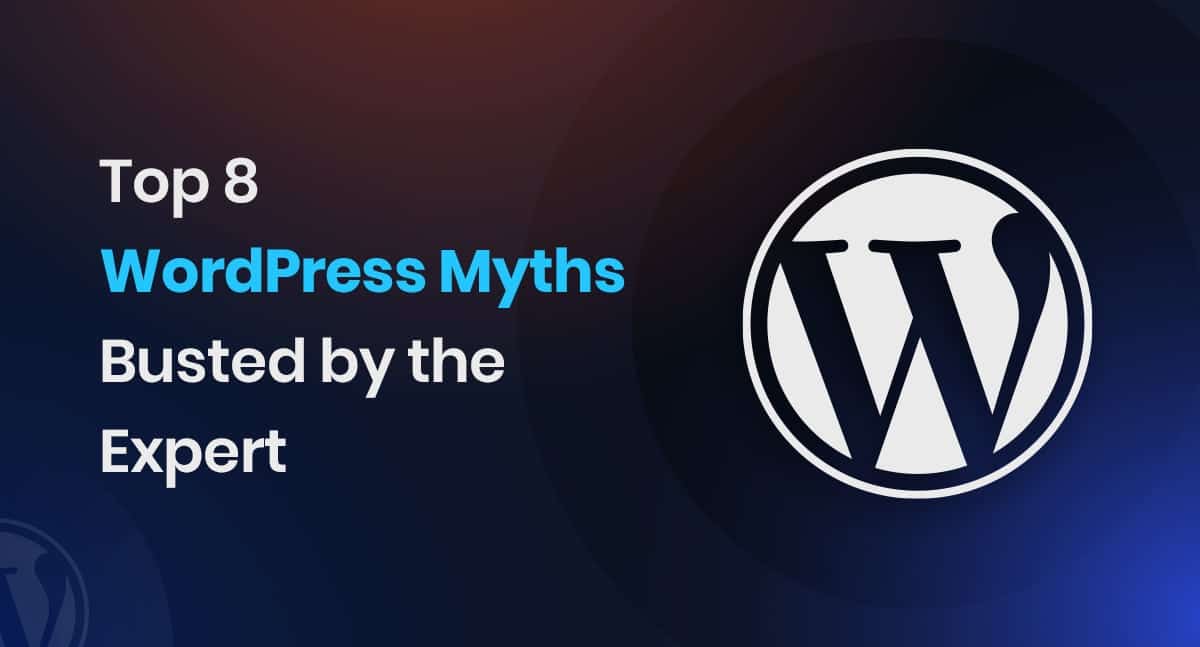Top 8 WordPress Myths busted by the Expert

Top 8 WordPress Myths Busted by the Expert
Website development is a vast landscape, and within it, WordPress stands tall as a prominent force that shapes much of the internet's content. However, misconceptions abound in its realm, clouding its true potential. As experienced professionals in WordPress development services, our years of expertise as a leading company allow us to dispel these myths and reveal the reality behind this dynamic platform.
WordPress, once a simple blogging tool, has evolved into a versatile content management system that serves various online needs. This article aims to debunk common misconceptions that often hinder individuals and businesses from fully embracing WordPress. By shedding light on topics like security, customization, performance, scalability, and its wide applicability, our goal is to provide a comprehensive understanding of WordPress beyond these myths. We are committed to empowering readers with accurate insights so they can confidently harness the immense potential of WordPress for their digital endeavors.
What is WordPress Myth
Dispelling WordPress myths involves addressing widely-held misconceptions and beliefs about the platform. These myths, often based on inaccurate information, can lead to misunderstandings and influence decisions regarding WordPress usage. From its capabilities to security, performance, scalability, and more, these misconceptions touch upon various aspects of the platform. To overcome these myths, providing accurate information and clarifications is paramount in assisting individuals and businesses with their informed decision-making process when considering WordPress for their websites or online projects.
Learn More: Building a Startup Website with WordPress: Key Considerations and Best Practices.
Myth 1: WordPress is Just for Blogging
WordPress is often associated with blogging, but it offers much more than that. Originally designed as a blogging platform, it has grown into a powerful content management system capable of supporting various types of websites. From e-commerce stores to business websites, portfolios, and even social networks, WordPress can accommodate diverse online ventures. One of its strengths lies in the vast array of plugins and themes available, allowing users to customize their websites to align perfectly with their specific needs and goals.
Myth 2: WordPress is Not Secure
Security concerns often discourage businesses from using WordPress. However, the platform's security reputation has significantly improved over the years. By regularly updating and utilizing security plugins, as well as adhering to best practices, businesses can enhance the security of their WordPress sites. Trustworthy WordPress development companies implement robust security measures to safeguard websites against potential threats.
Myth 3: All WordPress Sites Look the Same
The misconception that WordPress sites all look alike is completely inaccurate. Although there may be popular themes that lead to some similarities, the wide range of available themes and the ability to customize them extensively ensure that each WordPress site can have its unique appearance. Talented WordPress development services can create a design that perfectly aligns with your brand identity, making it stand out from the vast crowd of websites.
Myth 4: WordPress is Slow
Performance concerns often arise when people perceive WordPress as inherently slow. However, the speed of the platform largely depends on its configuration and the quality of hosting chosen. By optimizing properly, utilizing caching techniques, and leveraging performance-focused plugins, WordPress websites can achieve impressive loading times and responsiveness.
Myth 5: WordPress is Only for Small Businesses
WordPress offers scalability, making it suitable for businesses of all sizes. While small businesses appreciate its user-friendly interface, enterprises and large organizations can also capitalize on its extensive capabilities. With features like multisite functionality and enterprise-level hosting options, WordPress efficiently handles the demands of substantial online operations.
Myth 6: WordPress is Bad for SEO
In reality, WordPress lays a strong foundation for search engine optimization (SEO). Its clean code, customizable permalinks, and plethora of SEO plugins contribute to its overall SEO friendliness. By leveraging suitable plugins and following SEO best practices, WordPress websites can achieve impressive rankings in search engine results.
Myth 7: WordPress Doesn't Support E-commerce
Contrary to a common myth, WordPress is often considered unsuitable for e-commerce. However, this perception changes when one explores the capabilities of plugins like WooCommerce. With WooCommerce, WordPress transforms into a powerful platform for e-commerce. It empowers a significant number of online stores and offers an extensive range of features to effectively manage products, payments, and shipping operations in a seamless manner.
Myth 8: Regular Maintenance Isn't Necessary
Some individuals hold the belief that once a WordPress site has been launched, it can be left as is. However, it is crucial to prioritize regular maintenance to guarantee the security, performance, and functionality of the website. Consistent updates to WordPress core, themes, and plugins are necessary. Moreover, conducting periodic security audits becomes essential in order to effectively mitigate potential vulnerabilities.
Conclusion
As a reputable WordPress development company, we have dispelled prevailing myths that overshadow the platform's capabilities. With its adaptability, robust security features, and unparalleled versatility, WordPress emerges as the optimal choice for websites of various types and sizes. To unlock the full potential of WordPress, teaming up with an experienced provider of WordPress development services will guide you through intricacies and empower you to create a website that seamlessly aligns with your objectives. Do not let these misconceptions hinder you from harnessing one of today's most potent content management systems.




